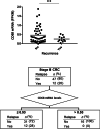Tumor-associated macrophages and risk of recurrence in stage III colorectal cancer
- PMID: 35318822
- PMCID: PMC9161313
- DOI: 10.1002/cjp2.267
Tumor-associated macrophages and risk of recurrence in stage III colorectal cancer
Abstract
Tumor-associated macrophages (TAMs) have a unique favorable effect on the prognosis of colorectal cancer (CRC), although their association with stage-specific outcomes remains unclear. We assessed the densities of CD68+ and CD163+ TAMs at the invasive front of resected CRC stage III CRC from 236 patients, 165 of whom received post-surgical FOLFOX treatment, and their relationship with disease-free survival (DFS). Associations between macrophage mRNAs and clinical outcome were investigated in silico in 59 stage III CRC and FOLFOX-treated patients from The Cancer Genome Atlas (TCGA). Biological interactions of SW480 and HT29 cells and macrophages with FOLFOX were tested in co-culture models. Low TAM densities were associated with shorter DFS among patients receiving FOLFOX (CD68+ , p = 0.0001; CD163+ , p = 0.0008) but not among those who were untreated. By multivariate Cox analysis, only low TAM (CD68+ , p = 0.001; CD163+ , p = 0.002) and nodal status (CD68+ , p = 0.009; CD163+ , p = 0.007) maintained an independent predictive value. In the TCGA cohort, high CD68 mRNA levels were associated with better outcome (p = 0.02). Macrophages enhanced FOLFOX cytotoxicity on CRC cells (p < 0.01), and drugs oriented macrophage polarization from M2- to M1-phenotype. Low TAM densities identify stage III CRC patients at higher risk of recurrence after adjuvant therapy, and macrophages can augment the chemo-sensitivity of micro-metastases.
Keywords: adjuvant therapy; cancer immunology; colorectal cancer; macrophage polarization; tumor-associated macrophages.
© 2022 The Authors. The Journal of Pathology: Clinical Research published by The Pathological Society of Great Britain and Ireland & John Wiley & Sons, Ltd.
Figures



References
-
- André T, Boni C, Mounedji‐Boudiaf L, et al. Oxaliplatin, fluorouracil, and leucovorin as adjuvant treatment for colon cancer. N Engl J Med 2004; 350: 2343–2351. - PubMed
-
- Taieb J, André T, Auclin E. Refining adjuvant therapy for non‐metastatic colon cancer, new standards and perspectives. Cancer Treat Rev 2019; 75: 1–11. - PubMed
-
- André T, de Gramont A, Vernerey D, et al. Adjuvant fluorouracil, leucovorin, and oxaliplatin in stage II to III colon cancer: updated 10‐year survival and outcomes according to BRAF mutation and mismatch repair status of the MOSAIC study. J Clin Oncol 2015; 33: 4176–4187. - PubMed
Publication types
MeSH terms
Grants and funding
LinkOut - more resources
Full Text Sources
Medical
Research Materials

